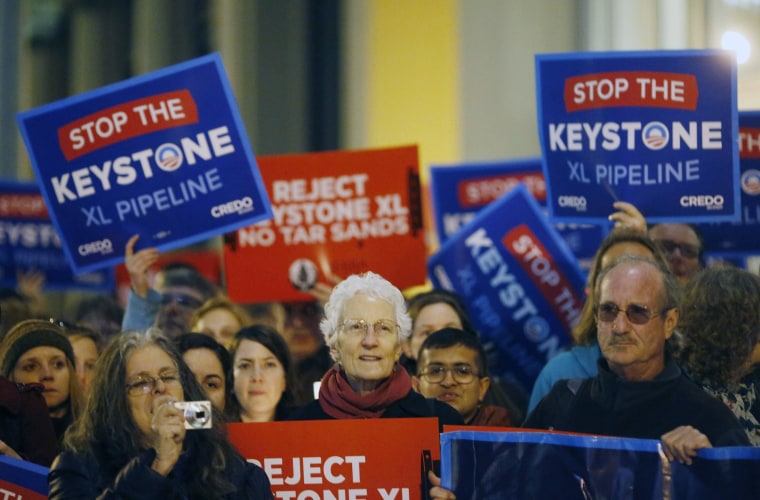The 2014 midterm elections saw a new entry in the growing ranks of wealthy individuals inserting themselves into the political spending scene to push issues and agendas of their own choosing. Billionaire investor Tom Steyer and his emergent NextGen Super PAC spent $60 million in seven states advocating action on climate change during this year’s election cycle. And while the effort’s success was less than stellar, the group vows that this initial effort has set the stage for bigger results in 2016.
Most of the money spent by NextGen to target candidates they call climate change deniers came from Steyer’s own pockets. And the efforts garnered support in some quarters. The group employed staff and volunteers in 50 offices in its targeted states and produced an array of ads, including one by Hollywood producer Darren Aronofosky that featured Woody Harrelson and aired during the World Series.
Despite the massive effort, only three of NextGen’s candidates won and one was Pennsylvania Democrat Tom Wolf who easily beat incumbent Gov. Tom Corbett on issues that went far beyond his stance on climate change. The other two winners: Sen. Jeanne Shaheen in New Hampshire’s Senate race and Rep. Gary Peters in the Michigan Senate race. That’s about a 40 percent success rate.
NextGen-backed candidates lost in the Florida gubernatorial race as well as the Iowa and Colorado Senate races.
Steyer’s investment in Colorado was “pretty substantial and did not do what they were hoping to do,” which was to beat Republican Cory Gardner, according to Floyd Ciruli, an independent pollster and political commenter in Colorado.
The Defense
But NextGen’s top strategist Chris Lehane said that while they did not win every race, the group has successfully put candidates on the defense and forced them to shift positions on climate change.
“How many elections cycles have a Republican stood in front of a windmill or planned an environmental tour,” Lehane said of Gardner, who won the Colorado Senate race on Tuesday. In a television ad during the campaign, Gardner hyped his support of green energy in Colorado. Gardner also changed his position mid-campaign on climate change from saying that humans don’t contribute to it to stating that pollution is a contributing factor.
A difficulty for groups like NextGen is that they are largely focused on one issue that and issues that aren’t necessarily at the top of voters’ minds.
For instance, while 61 percent of Democratic respondents said climate change is very or extremely important, the issue ranked 11th out of 13 topics Democratic voters prioritized, according to an October Gallop Poll. For Republicans registered voters, climate change came in last with only 19% saying it is important.
In a recent interview, Republican strategist Ron Bonjean contended that Steyer is “throwing his money away.”
“Climate change is just on the radar screen of voters at this point. It’s not important to voters in many of these battleground states,” Bonjean added.
The Response
“I may be new to politics, but there’s one thing I know – investing in democracy is, without question, a winning proposition,” Steyer wrote in a post-Election Day op-ed in the Huffington Post.
Steyer insisted that 2014 was “an unprecedented year for climate action” as NextGen successfully ensured that the issue “is officially on the ballot and politicians have been put on notice: Refusing to accept the science of climate change will undermine your credibility.”
Lehane said they surpassed their goal by 50,000 to sign up 250,000 climate change–focused activists in targeted states.
It was a tough election for Democratic candidates. It is not uncommon in a world of unlimited political spending for outside groups to spend tens or hundreds of millions of dollars with little success. The same criticism was made of former President George W. Bush strategist, Karl Rove, who started the groups American Crossroads and Crossroads GPS as well as Americans for Prosperity, a super PAC backed by the wealthy conservative entrepreneurs Chalres and David Koch. After the 2012 election, where the three groups combined spent around $300 million dollars backing Republican presidential candidate Mitt Romney, critics gleefully pointed out their horrible rate of return.
But just two years later, the Koch and Rove groups had much more success, winning at least 80 percent of races.
The Introductory Year
Steyer argues that 2014 was their introduction to the electorate and their first opportunity to make both climate change and political spending voting issues. They both say that 2014 was just the opening act for 2016. “This has always been a multicycle approach,” Lehane said.
The states NextGen chose to play in was strategic – Iowa, the first presidential caucus state; New Hampshire, which holds the first presidential primary; and Florida and Colorado, both critical battleground states.
Steyer wrote on Wednesday: “It’s time to face the facts, we’re just getting started.”
